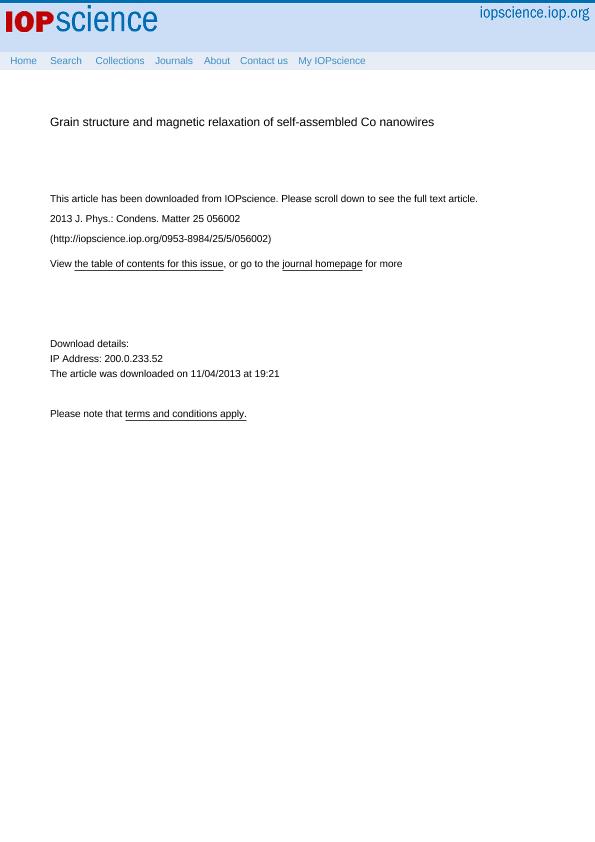Mostrar el registro sencillo del ítem
dc.contributor.author
Schio, P.
dc.contributor.author
Bonilla, F. J.
dc.contributor.author
Zheng, Y.
dc.contributor.author
Demaille, D.
dc.contributor.author
Milano, Julian

dc.contributor.author
de Oliveira, A. J. A.
dc.contributor.author
Vidal, F.
dc.date.available
2017-01-10T22:05:16Z
dc.date.issued
2013-01
dc.identifier.citation
Schio, P.; Bonilla, F. J.; Zheng, Y.; Demaille, D.; Milano, Julian; et al.; Grain structure and magnetic relaxation of self-assembled Co nanowires; IOP Publishing; Journal of Physics: Condensed Matter; 25; 5; 1-2013; 56002-56002
dc.identifier.issn
0953-8984
dc.identifier.uri
http://hdl.handle.net/11336/11107
dc.description.abstract
The magnetic relaxation of Co nanowires assemblies embedded in CeO2/SrTiO3(001) epilayers has been investigated by magnetization decay measurements. Two different samples were studied, with nanowires having distinct crystallographic structures and diameters of 3 and 5 nm. The structure of the nanowires was derived from high-resolution transmission electron microscopy analysis. The 3 nm diameter nanowires are made of hcp Co grains with the c-axis pointing along one of the four h111i directions of the CeO2 matrix, separated by fcc Co regions. In the 5 nm diameter nanowires, the grains are smaller and the density of stacking faults is much higher. The magnetic viscosity coefficient (S) of these two systems was measured as a function of the applied field and of the temperature. Analysis of the variation of S and of the activation volume for magnetization reversal reveals distinct behaviors for the two systems. In the nanowires assembly with 5 nm diameter, the results can be described by considering an energy barrier distribution related to shape anisotropy and are consistent with a thermally activated reversal of the magnetization. In contrast, the anomalous behavior of the 3 nm diameter wires indicates that additional sources of anisotropy have to be considered in order to describe the distribution of energy barriers and the reversal process. The distinct magnetic behaviors observed in these two systems can be rationalized by considering the grain structure of the nanowires and the resulting effective magnetocrystalline anisotropy.
dc.format
application/pdf
dc.language.iso
eng
dc.publisher
IOP Publishing

dc.rights
info:eu-repo/semantics/openAccess
dc.rights.uri
https://creativecommons.org/licenses/by-nc-sa/2.5/ar/
dc.subject
Magnetic Properties of Nanostructures
dc.subject
Self-Assembly
dc.subject
Quantum Wires
dc.subject
Magnetic Anisotropy
dc.subject
Magnetization Reversal Mechanisms
dc.subject.classification
Física de los Materiales Condensados

dc.subject.classification
Ciencias Físicas

dc.subject.classification
CIENCIAS NATURALES Y EXACTAS

dc.subject.classification
Nano-materiales

dc.subject.classification
Nanotecnología

dc.subject.classification
INGENIERÍAS Y TECNOLOGÍAS

dc.title
Grain structure and magnetic relaxation of self-assembled Co nanowires
dc.type
info:eu-repo/semantics/article
dc.type
info:ar-repo/semantics/artículo
dc.type
info:eu-repo/semantics/publishedVersion
dc.date.updated
2017-01-06T20:02:35Z
dc.journal.volume
25
dc.journal.number
5
dc.journal.pagination
56002-56002
dc.journal.pais
Reino Unido

dc.journal.ciudad
Londres
dc.description.fil
Fil: Schio, P.. Universite de Paris Vi. Institut Des Nanosciences de Paris; Francia. Universidade Federal do Sao Carlos; Brasil
dc.description.fil
Fil: Bonilla, F. J.. Universite de Paris Vi. Institut Des Nanosciences de Paris; Francia
dc.description.fil
Fil: Zheng, Y.. Universite de Paris Vi. Institut Des Nanosciences de Paris; Francia. Laboratoire International Franco-Argentin en Nanosciences; Argentina
dc.description.fil
Fil: Demaille, D.. Universite de Paris Vi. Institut Des Nanosciences de Paris; Francia
dc.description.fil
Fil: Milano, Julian. Universite de Paris Vi. Institut Des Nanosciences de Paris; Francia. Laboratoire International Franco-Argentin en Nanosciences; Argentina. Comision Nacional de Energia Atomica. Centro Atomico Bariloche; Argentina. Comisión Nacional de Energía Atómica. Gerencia del Area de Energía Nuclear. Instituto Balseiro; Argentina. Consejo Nacional de Investigaciones Científicas y Técnicas; Argentina. Universidad Nacional de Cuyo; Argentina
dc.description.fil
Fil: de Oliveira, A. J. A. . Universidade Federal do Sao Carlos; Brasil
dc.description.fil
Fil: Vidal, F.. Laboratoire International Franco-Argentin en Nanosciences; Argentina. Universite de Paris Vi. Institut Des Nanosciences de Paris; Francia
dc.journal.title
Journal of Physics: Condensed Matter

dc.relation.alternativeid
info:eu-repo/semantics/altIdentifier/url/http://iopscience.iop.org/0953-8984/25/5/056002/
dc.relation.alternativeid
info:eu-repo/semantics/altIdentifier/doi/http://dx.doi.org/10.1088/0953-8984/25/5/056002
Archivos asociados
